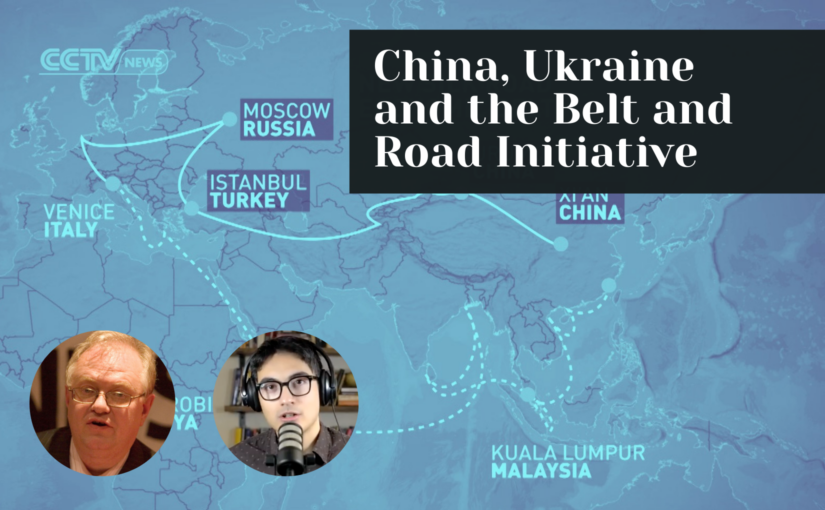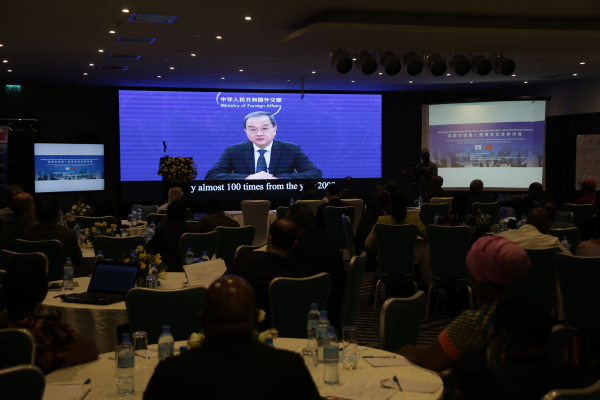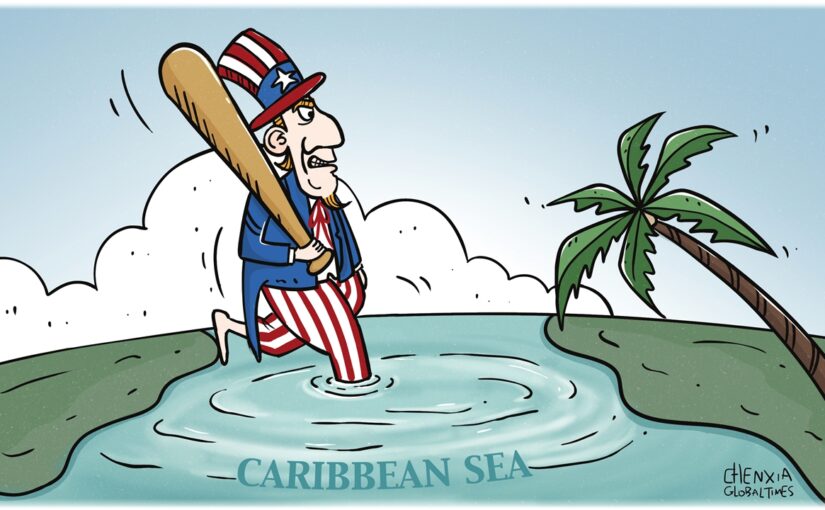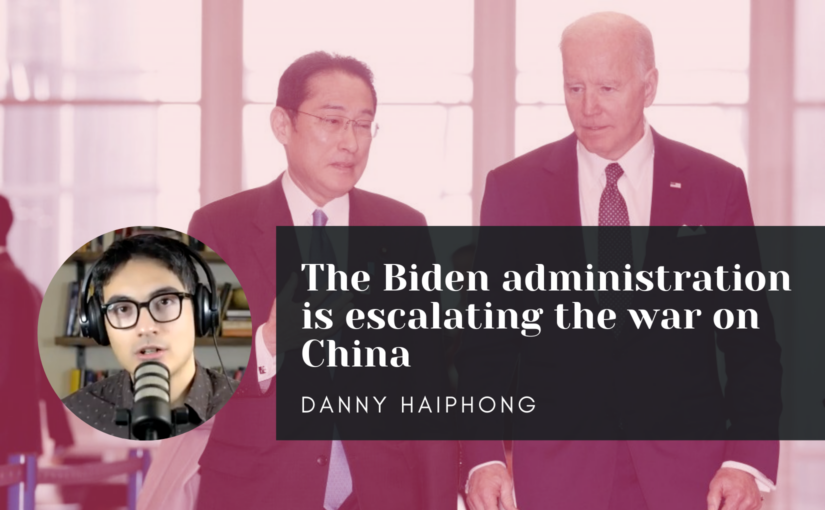On Saturday May 21st, Friends of Socialist China joined the Belt and Road Initiative Quarterly (BRIQ) journal, the Russian Cultural House in Ankara, the Turkish Students Union in China and the Istanbul Kent University as a co-organizer of a conference themed on ‘The Challenges and Opportunities for BRI Under the Background of the Ukraine Crisis’. It was a hybrid event, held both online and physically at Kent University.
Our co-editors Danny Haiphong and Keith Bennett both presented papers and we reproduce them, slightly edited for publication, below. The other speakers were Adnan Akfirat, Chair of the BRIQ journal; Professor Hasret Comak of Istanbul Kent University; Professor Ma Xiaolin of Zhejiang University; Daria Platonova of Moscow State University; Rajiv Ranjan, Associate Professor at Shanghai University; Pakistani Senator Mushahid Hussain; Dr Vali Kaleji of Tehran University; and Dr. Ahmet Shahidov, Chair of the Azerbaijan Institute for Democracy and Human Rights.
The full event can be viewed on Facebook Live.
Danny Haiphong: Why the Belt and Road Initiative won’t be derailed by the Ukraine crisis
Thank you to all the organizers of this event, including the Belt and Road Initiative Quarterly Journal, the Russian Cultural House in Ankara, the Friends of Socialist China platform which I co-edit, the Turkish Student’s Union, and Kent University. My discussion centers on the politics of the Belt and Road Initiative (BRI) and how they ensure that the development plan won’t be derailed by the monumental crisis underway in Ukraine.
The Ukraine crisis has revealed quite starkly that there is a huge divergence between the path that’s being taken by the United States, NATO, the EU, and that of China. The former, perhaps more aptly called the Western imperialist sphere, has poured gasoline onto the fire that is the Ukraine crisis. The consequences have been enormous. Sanctions on Russia have sent shockwaves throughout the global economy. Economic growth has declined and inflation skyrocketed. The IMF’s economic forecast is dimmer now than it was prior to the Ukraine crisis and much of this is due to Western imperialist policy.
On the other hand, for China and the BRI, the situation is quite different. A commitment to peace and neutrality, cooperation, and robust and quality growth characterizes the partnerships within the BRI. It is clear that the massive trade and infrastructure project is not a prisoner of the moment. The BRI is not just about a single region or a particular country but rather an overall vision for global development that seeks to harness the present to brighten the future. The BRI does what Western-led economies such as the United States and its allies cannot and will not do, which is to offer opportunities for economic progress and true investment in all areas social and economic development.
The BRI, as Xi Jinping remarked, began in China but its achievements belong to the world. There are 140 countries and 30 international organizations that have already signed on to the BRI since 2013. Thus far, 8 trillion USD in trade and investment has been directed toward the BRI to cover the cost of more than 2,500 projects worldwide. The size and scope of the BRI demonstrates that it is not dependent upon the whims and the interests of the U.S. and the West. The BRI operates almost entirely independent of from Western imperialism, with the exception of the European countries which have accepted China’s invitation to join the project.
It is also worth noting that China is no stranger to operating in conflict zones. The world has been engaged in a war against the COVID-19 pandemic over the past several years and yet China has not only been able to extend solidarity and cooperation over this period but also advance the aims of the BRI. China has adjusted its own economic and political development in a way that takes into account the challenges of the global pandemic. That’s why China has achieved so much success in containing the pandemic and led the way in providing critical solidarity in the form of vaccines and protective equipment to Asia, Africa, and Latin America. The pandemic has been a flashpoint for a people’s war to protect human life and this war is inextricably linked to the BRI’s overall vision.
China has also prioritized Belt and Road Initiative relationships with countries such as Pakistan that have been embattled with external and internal conflict. Pakistan has been subject to numerous conflicts over the past decade alone, whether in the form of the U.S.’s drone strikes killing thousands of civilians or the ongoing struggle in Kashmir. While these sensitive issues have inevitably caused economic difficulty, Pakistan and China’s cooperation in the BRI through the China-Pakistan Economic Corridor (CPEC) has only grown. The BRI has already brought about significant achievements in Pakistan such as the launch of the first transit system in Lahore in 2020 amid the COVID-19 pandemic.
No matter what is happening internally in Pakistan, the BRI’s vision of development which emphasizes win-win cooperation rather than political interference or influencing the politics internally of any one country has been a major reason as to why these two nations have been able to build such a strong friendship despite internal and external threats to Pakistan’s stability. This includes a recent change in political administration just in the last few months.
The Biden administration recently completed his first trip to Asia, visiting South Korea and Japan in an attempt to organize the Southeast Asia into a conflict with China. The region has quickly become the most important flashpoint in the U.S.’s New Cold War and has been flooded with hundreds of U.S. military bases and hundreds of thousands of U.S. military personnel. Still, China has been able to build even stronger relations with the region that have led to remarkable achievements in the last few years alone. In 2021, the Sino-Laos high-speed railway was launched and is projected to increase economic growth for Laos by several percentage points. Laos is a country that was bombed by the U.S. more times than the entire number dropped in World War II during the U.S. invasion of Vietnam, Laos, and Cambodia in the 1960s and 1970s.
In January 2022, Syria joined the BRI as a major step in its own rebuilding process from the U.S.-led war on the country. The U.S. currently occupies 30 percent of Syria’s territory. Despite being engaged in a deadly conflict that has displaced millions and killed more than 300,000 people, the Syrian government is committed to rebuild the country through the BRI.
Of course, the Ukraine crisis has indeed inflicted damage on the global economy. Mainstream media reports have emphasized disruptions in rail traffic that have slowed global trade to Europe. While these short-term challenges will delay certain aspects of the BRI, particularly the Eurasia rail link, the vision of the BRI is more than a century long and remains an incredibly attractive project for development. The Ukraine crisis does not take away from the BRI’s global advantages. In fact, the Ukraine crisis is likely to make the BRI even more attractive to countries around the world, including Ukraine.
For one, the United States and its allies offer few alternatives in the form of financial and economic arrangements to help rebuild from conflict and war. Furthermore, the United States and the West is pursuing a policy that will make the Ukraine’s economy “scream,” to paraphrase Henry Kissinger’s description of Chile in 1970s during the U.S.-backed coup there. The U.S. has provided predatory loans to Ukraine since the war began. In addition, the U.S.-sponsored lend-lease program has provided Ukraine billions in military aid, $40 billion of which was just passed in the U.S. Congress. Ukraine will be expected to pay back what it has received in conditional aid, making these arrangements detrimental to Ukraine’s long-term economic stability and growth.
The neoliberal policies of the U.S. and the West are laying the foundations for the BRI to become an even more important feature of Ukraine’s economic future. Ukraine is one of the earliest member of the BRI. China’s capacity to maintain a stable relationship with Ukraine and strengthen the Russia-China partnership at the same time has demonstrated what it means to place narrow and selfish interests to the background and the interests of humanity in the foreground. Whatever short term difficulties arise from the Ukraine crisis will not derail Latin America, Africa, and Central Asia’s desire to adhere to the BRI’s principles of creating a win-win model of infrastructure and economic development that addresses the need for real South-South cooperation, decreases extreme poverty, and reduces dependency on external lenders.
The BRI is already doing just that. The World Bank has acknowledged that the BRI offers a path forward out of extreme poverty. Monumental achievements have already come out of the BRI in countries such as Pakistan and Laos. Though the Ukraine crisis is a warning shot about the dangers of war and the neoliberal path led by Western imperialism, China’s approach to global development as manifested in the BRI will not just remain consistent but is also likely to strengthen its influence within the international order in the coming period.
Keith Bennett: China, Ukraine and the Belt and Road Initiative
Thank you for your invitation.
I would like to offer some brief comments on four of the topics you raise, namely:
- The effect of the Ukraine crisis on the use of national currencies in foreign trade
- The consequences of US and EU sanctions on the BRI
- The impact of the crisis on the international pro-USA terrorist network
- The impact of the crisis on the energy security of the EU and China
With regard to the first issue, namely the effect of the Ukraine crisis on the use of national currencies in foreign trade, I believe it is likely to have a profound impact. Developing countries, especially Russia and China, but also others, such as the other members of the Eurasian Economic Union, some African countries, the ALBA grouping led by Venezuela and Cuba, and so on, have been exploring this for some time. But this will now intensify. As will the development of digital currencies by countries like China.
The major sanctions imposed on Russia and Belarus will undoubtedly cause considerable difficulties in the short to medium term.
However, strategically they are an example of what the Chinese leader Mao Zedong called, lifting a rock only to drop it on your own feet.
In fact, they really announce the end of dollar hegemony. Measures like excluding Russian banks from the SWIFT international payments system were prefigured, for example, in the sanctions imposed on Iran. But this is the first time that such measures have been taken against a G20 economy, a member of the Permanent Five on the United Nations Security Council and a major nuclear power.
We know that China is looking very closely at the implications of this for its own economic and financial security.
We’ve also seen the imperialist powers freezing the assets of so-called Russian oligarchs. Literally stealing them. Incidentally, one should note that the likes of Roman Abramovich, Alisher Usmanov and Oleg Deripaska are always described with the pejorative term oligarch, whereas the likes of Jeff Bezos, Elon Musk and Bill Gates are described as entrepreneurs. However, the combined wealth of the last named three equals the combined wealth of all of Russia’s top 20 ‘oligarchs’ – that is before the recent assault on their wealth.
Such actions are again in a sense nothing new. We’ve seen them in numerous cases recently, like Afghanistan, Venezuela, Iran and so on. Even as far back as the Albanian gold illegally held by the Bank of England from 1948-1996, a full half century.
But again, this is unprecedented in its scope – being against a major power and not just against its national institutions, but also against numerous individuals, some of them apparently designated solely as a result of citizenship or even just ethnicity.
The implications of this are huge.
If you are a citizen of any country of the Global South – be it Saudi Arabia, Qatar, the United Arab Emirates, Kazakhstan, Azerbaijan, India, Pakistan, or wherever – how secure should you now feel about investing, depositing funds, or acquiring assets in the United States or the United Kingdom? When, should your government do anything to displease Washington or London, they can be frozen or confiscated overnight, apparently on a whim and with little or no regard for the so-called ‘rule of law’.
Yet it is partnerships such as these that financial centres like the City of London, on which the UK economy is disproportionately dependent, are increasingly reliant upon. It will therefore lead to the relative decline of long-established financial centres in the UK and elsewhere and impel the growth and development of new ones, along the Belt and Road, including in countries like Turkiye and Kazakhstan, as well as in the Far East, including in Hong Kong and Shanghai.
Regarding the consequences of US and EU sanctions on the BRI, I think it will have a contradictory impact. On the one hand, part of the dynamic of the BRI was to draw to draw together the whole of the Eurasian space through increased trade, enhanced connectivity, developed infrastructure and so on. Clearly the EU is to a large measure and for now excluding itself from a number of these aspects, which is absolutely not a situation that China wishes to see. However, the unity of the EU in this aggressive policy is not so solid as is being suggested. Countries with energy supplies that have pivoted on Russia, those with traditionally strong economic or cultural ties, or who preserve some measure of independence and neutrality in their politics and diplomacy are already restive. This can only increase as the economic pain that Europe has brought on itself increases. There are already signs that Berlin, Paris and Rome do not share London and Washington’s apparent appetite for endless war.
However, there are other challenges, too. In general terms, conflict is simply not conducive to investment and development. Trade, transport, logistics, communications and connectivity are disrupted, not only by the fighting itself, but also by ruptured political relations, sanctions, such as on overflights, and so on. And the threat or use of secondary sanctions is also a very serious one.
But, whilst serious, many of these issues are essentially transient in nature. The potential of this conflict to reconfigure the international balance of forces lends greater urgency to BRI and to enhancing the unity of the Global South, something that is reflected, for example, in their almost unanimous rejection of sanctions on Russia.
Regarding the impact of the crisis on the international pro-USA terrorist network, again I think the impact will be contradictory. Terrorist networks instigated or manipulated by the imperialist powers may ultimately serve one goal, but they take different forms.
If Russia is successful in attaining its military objectives, then the anti-hegemonic front will be strengthened and it will be in a more advantageous position to confront and defeat terrorist forces.
However, the resilience of such forces should not be underestimated. For example, the leadership of the Taliban has repeatedly expressed a wish to have good neighbourly relations with China and other countries. But it seems hard for them to fully enforce this, including on some of their rank and file and regional commanders. Hence, there have been border incidents with Pakistan and Iran, the Pakistan Taliban has increased its activities and the central Taliban authorities are not yet in a position to completely suppress groups like the East Turkistan Independence Movement (ETIM) or Islamic State – Khorasan Province (IS-K), the local franchise of Daesh, which has emerged as the Taliban’s rival.
In the case of Ukraine, we know that neo-nazi and far right elements are flocking there from throughout Europe and North America. In the future, some of them will definitely pose a threat to their own societies. This is exactly what we saw with Afghanistan from the 1980s onwards and with Syria and Libya more recently. This is precisely what the American political scientist Chalmers Johnson termed blowback.
Finally, regarding the impact of the crisis on the energy security of the EU and China. In a word the impact is likely to be negative for the EU and positive for China. That the results are not what the EU intended can already be seen from the spiraling costs of energy, Russia’s increased earnings from energy exports and the strengthening of the ruble. At present, Germany has wasted billions on the now mothballed Gazprom 2 project. Meanwhile, countries like Hungary, are already indicating their willingness to pay their energy bills in rubles.
Further, in seeking to find alternative energy sources, it is not all plain sailing for the EU. Most of Qatar’s natural gas production is tied up in existing, long-term contracts, principally with the Far East. Saudi Arabia, at least for now, is sticking to its OPEC+ agreements and refusing to increase production. And it is indicating a willingness to price its oil exports to China in RMB, the so-called petroyuan. Both France and Spain have issues with Algeria – France due to the colonial legacy and Spain due to its acquiescence to Moroccan demands concerning the liberation struggle of the Saharawi people led by the Polisario Front.
In the case of China, close energy ties with Russia have been developing for some time now, for example through Gazprom’s Power of Siberia natural gas pipeline, part of a deal generally valued at $400 billion.
Whilst there are obvious, and not insignificant, obstacles to be overcome, China is essentially well positioned to absorb whatever Russian energy that the EU elects not to purchase.
China can also be expected to increase its interaction with other regional energy suppliers that are not impacted by potential maritime chokeholds. Turkmenistan, Kazakhstan, Myanmar and, with enhanced BRI connectivity, Iran and Iraq, are all important in this regard.






